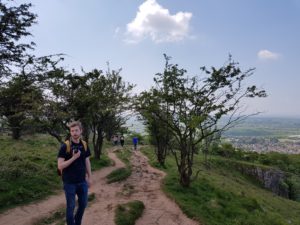Our guest blogger this week is Chris Ellis who graduated with a BSc. Hons in Natural Sciences with a placement in 2017 and recently completed his MSc in Biosciences gives an honest account of his career journey to date. Chris gives a real insight into the hurdles of finding a graduate job and how he has stayed motivated on his journey.
“Tell me about yourself” - I am twenty-six years old, I have high functioning autism, and I’m looking for a job. Is that what you wanted to know? Or did you want more information? Job hunting for me as an autistic is a lot like this vague question. It is a journey of implicit questions and constantly changing goalposts, adding an extra step of effort in the search for a job.
So far, I have experienced one year of job searching, and through my experiences of applications, interviews, feedback and rejections, I wanted to reflect on my journey so far.
Going into this process, I had absolutely no idea what I wanted to do. The previous five years were spent studying a Bachelors and Masters of Science at the University of Bath. I was not convinced if academia was the route I wanted to follow, and I instead opted to search for graduate schemes that offered intellectual stimulation and personal growth in a business setting. That still left me with a lot of breadth, but no direction. My family were frustrated at my resistance to narrowing this breadth into a career direction, and conversations on the subject would end with me curtly responding with ‘Yes’, ‘No’ and ‘OK’ in an attempt to draw the topic to a close after it became too much (a process that was painfully similar to my choosing a university course). The only way I stepped out of the unknown direction was by speaking to people, an ironic juxtaposition for an autistic person! Speaking to friends, family and employers gave me the confidence to choose a path. I also realised that employers want me to make the right choice, and will make the effort to let me know what a position entails. Thankfully, my initial fears that I was going to be judged, grilled or both at a careers fair were unfounded.
One of my first applications was to a major institution, and required jumping through hoops that tested my verbal, numerical, situational judgement and motivation. A process that was stressful in itself, and was compounded by the need to complete coursework submissions for my Master’s degree. Through all these hurdles, I passed and was eventually invited to an assessment centre. I excitedly brought the news to my careers advisor, and set about practicing interview techniques for the big day. In preparation, I sent a document asking for reasonable adjustments, for what I thought would cover any difficulties that may arise. Suffice to say, this most definitely did not provide sufficient cover. After being notified of my rejection, I saw my feedback report: “more energy and enthusiasm in their delivery would have made their answers more impactful” read one part. Autistic people do feel emotion, but effective expression can be a bit trickier. Another part read “Although the examples were good they needed to more clearly articulate the detail to show where they made an impact”. When it comes to my autism and my inexperience of assessment centres, I only requested adjustments for situations that I knew about, but missed some of the subtler but equally important aspects, like the tendency for my brain to wander mid-sentence. So in effect, it was beneficial to go through the stress of a process in order to better understand my autism and the adjustments I should ask for. I now make an effort to highlight to recruiters how my autism will affect my portrayed enthusiasm, and ask for a pen and paper to be provided for every spoken interview so I can plan an answer and keep my mind on track.
When reading my first rejection letter in my university dormitory, I felt a pit of disappointment form. Having invested time and energy into the process, it felt like an unsatisfactory conclusion. Initially I did not want talk about it, suppressing until a motivational barrier formed, preventing me from applying for other schemes. This part of me reacted in a way that felt like, “They do not think I am worth it, so I must be an undesirable candidate, why bother applying for other jobs?”. Only after opening up about my disappointment to others was I able to resolve this emotion and its unfounded motivational depressor. That is not to say the second, third, fourth and fifth time got any easier, I just knew that discussion was a positive strategy to move more quickly past the rejection.
With each disappointment, I learnt that it was important to remain optimistic. Each hurdle, rejection and feedback report was another way in which I can develop. For example, I thought I was really good at numerical reasoning, until I failed at that stage for one particular assessment. The recruiter posed 18 questions with a 6-minute timer, each requiring a multi-step calculation. My reaction was admittedly unrefined - PANIC! Rushing each question to beat the clock, I finished the assessment knowing I didn’t do well. Cue the arrival of an automated rejection email. I sat back and thought, what went wrong? I resolved to improve. I realised the assessment was checking my performance under pressure. The next day, I checked out two books on numerical reasoning assessments from the local library, and worked through both until I could work effectively under pressure. After that experience, I have yet to fail a numerical reasoning test. So for me, rejection has turned from a depressive episode into a pointer towards a new area for development.
Having the resolve to make a change in my feelings, thoughts and approaches has perhaps been my biggest positive step forward in this entire episode. A change in the breadth of career focus, my attitude to rejections, and my ability to turn each into a development opportunity. The most important instigator of this change in my character has been my support network. Friends, family and career support staff encouraging me to pursue a career, supporting me at every stage of an application, and giving me the confidence to continue.
So even though job hunting can feel like the vague question of “tell me about yourself”, it has also been a great driver of positive change in my life.
Additional Information from the Careers Service:
If you are an autistic student and would like support with finding a placement or a graduate job, then do contact us here at the Careers Service - careers@bath.ac.uk. You can also check out our resources at www.myfuture.bath.ac.uk with search word "autism". You may also be interested in:
Assessment Centre Workshop for Autistic Students - 6 March
Bath Employment Spring School for Autism - Moving From University to Work - 17 and 18 April
Respond

